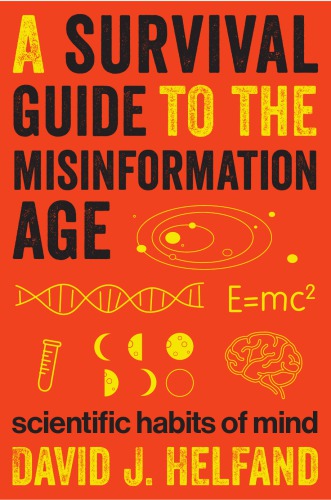
A Survival Guide to the Misinformation Age
Scientific Habits of Mind
کتاب های مرتبط
- اطلاعات
- نقد و بررسی
- دیدگاه کاربران
نقد و بررسی

January 4, 2016
Advertisers, public figures, and the media in general regularly misinform the public, but the Internet has taken this to a new level, reports Helfand, former chair of Columbia University’s department of astronomy. This cheerful corrective defines and demolishes many categories of nonsense. Warning that the brain is programmed to find patterns where none exist and to prefer simple, vivid explanations for reality, Helfand proceeds to show how competent scientists work and how to tell good evidence from bad. This turns out to be no simple task. Even scientists fail regularly, and readers must be prepared for meticulous explanations of scatter plots, Gaussian and Poisson distributions, proxies, and probability. Popular science writers traditionally boast that they will go light on mathematics, but Helfand will have none of that. As Jonathan Swift wrote, “Reasoning will never make a man correct an ill opinion which by reasoning he never acquired,” so this book will not attract climate-change deniers, anti-vaccine activists, creationists, astrology lovers, and the like. Darrell Huff’s delightful 1954 classic How to Lie with Statistics may be more accessible, but Helfand’s work is an admirable response to a long-standing problem of sloppy thinking.

January 1, 2016
How do you know what you know? Today we have available an abundance of resources, but how do we make use of them skillfully? Helfand (astronomy, Columbia Univ.) sees a "misinformation glut," made possible and often profitable by the Internet's largely unfiltered nature combined with human nature. He offers a practical guide to building one's own set of filters through an understanding of how science works and how it can be used. He systematically describes the habits of mind that allow a rational approach to the world, offering tools to help focus on, recognize, and accept reality even when it isn't what feels good. Topics covered include a definition of science emphasizing falsifiability; the use of quick estimates to assess claims; probability; correlation related to causation; and the uses and misuses of statistics. A summary chapter uses climate change as a model to put all of the recommended tools to use. VERDICT This important and timely outline of a logical approach to looking at information is widely accessible, with some knowledge of math helpful to readers. To assist in that area, Helfand offers appendixes with a variety of refreshers and accompanying problems.--Richard Maxwell, Porter Adventist Hosp. Lib., Denver
Copyright 2016 Library Journal, LLC Used with permission.

























دیدگاه کاربران